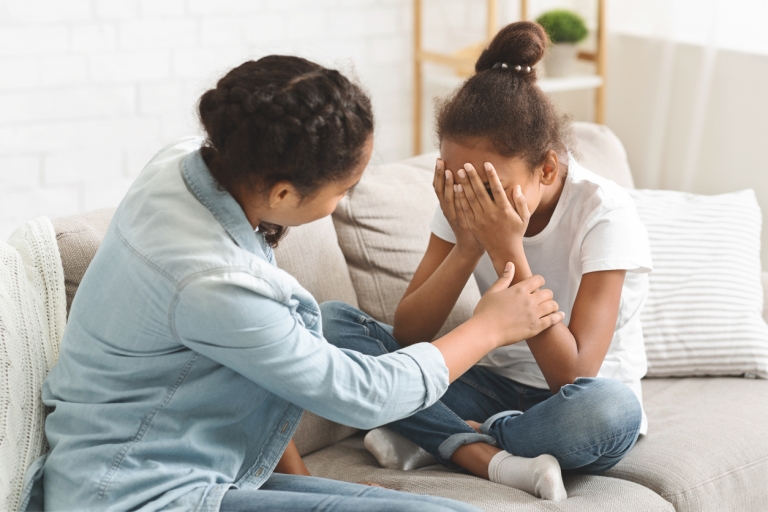11/8/23 blog post
what to do when a child has a big loss or change

Grief is often talked about when a loved one dies, but children can experience grief at other times – when a caregiver is deployed, moving into a new neighborhood or classroom, when a friend doesn’t want to be friends anymore. Feelings of grief are a response to a change that the child didn’t ask for. When feelings are ignored or misunderstood, it can be even harder on a child’s mental health.
We have seven suggestions for helping a child who is grieving a loss or change. We also have a free download to help your child through this process.
- Expect a variety of symptoms – you may see emotions (including sadness and anger), physical symptoms (like headaches, stomachaches or trouble sleeping), social struggles (like withdrawing from friends) or behavioral issues (not paying attention, tantrums, etc.). When you have a quiet moment, ask your child how they’re feeling and if it’s related to the loss.
- Create a safe place to share their feelings – ask them how their life has changed rather than minimizing their loss. Encourage them to share their feelings with you and allow them to process their emotions without judgment. Keep in mind that they may have strong feelings one day and seem to be “over it” the next. Consider using our download to help them honor their loss.
- Try not to solve their problems/feelings – of course, you don’t want to see a child hurting. But if you minimize or brush off their problems: “Be thankful you got to have that extra time with your mom before she was deployed!” or “Your cousin left for college, but you can FaceTime him.” Grief is not something that you can “fix” for someone else. Just being present, loving and taking the time to listen will be the best support you can offer.
- There is no right way to grieve – sometimes it seems as if a child is overly upset by a loss that doesn’t seem like that big of a deal to us. But all losses are unique and there is no right way or wrong way to grieve.
- Share, when appropriate – it may be helpful to talk to your child’s teacher, coach, mentor or school counselor about how your child is feeling about the loss in their life. Ask your child who they want to know about what they’re going through. Having support from many people can be very helpful.
- Be honest about what you know, and don’t know – if a child’s friend has moved away, don’t promise them that they’ll make another best friend or they may lose trust in you if that doesn’t happen. We don’t have all the answers and it’s good to be open about that with your child.
- Find way to connect and share memories – When kids can talk in an ongoing way about their loss, they can process and move through grief. Use the memory maker download to find ways to capture memories or do activities that help them talk about what they're feeling and missing.
should we see a therapist?
Because grief is complex and doesn’t follow a schedule, it can be hard to know if your child’s behavior or emotional problems are part of grief or something else. If they don’t seem to have interest in activities that they used to enjoy, are struggling in school or they are withdrawing from their friends, you’ll want to seek support from your child’s pediatrician or a mental health therapist.
free download: help your child capture important
memories
If your child is missing someone in their lives, you can help them to create a memory maker to help them process their emotions.
Click the button below to download this free worksheet and get started today. Or download it en español here.


